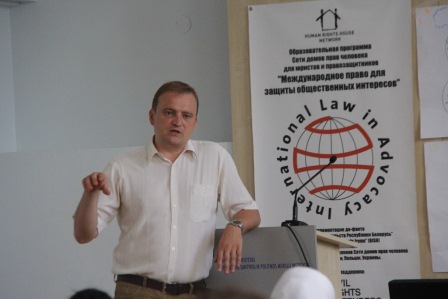Collection of authors’ materials and documents “Bring international standards home: the experience of ILIA alumni in Belarus” was published in the framework of the Human Rights House Network program “International Law in Advocacy” (ILIA). This is the fifth book in the series of publications of the program since 2007.
 The book pays significant attention to the opportunities of international standards’ implementation in the Belarusian national legal system. “The uniqueness of the book is that it shows that the international legal standards of the human rights protection can “work” in a country where, it would seem, there are no conditions for this. The book contains real-world examples which show that, due to the principle of universality of human rights, the implementation of international legal standards for the protection and promotion of human rights and freedoms is possible, despite the differences and constraints of separate national systems “- notes Liudmila Ulyashyna, ILIA Program Manager (left) in the introduction to the book.
The book pays significant attention to the opportunities of international standards’ implementation in the Belarusian national legal system. “The uniqueness of the book is that it shows that the international legal standards of the human rights protection can “work” in a country where, it would seem, there are no conditions for this. The book contains real-world examples which show that, due to the principle of universality of human rights, the implementation of international legal standards for the protection and promotion of human rights and freedoms is possible, despite the differences and constraints of separate national systems “- notes Liudmila Ulyashyna, ILIA Program Manager (left) in the introduction to the book.
 According to Aleh Aheyeu (right), the ILIA program graduate and editor-in-chief of the collection, the work on the book was held in several stages and took about a year. First, the best practices of ILIA alumni in Belarus on the implementation of international human rights standards into the national legal system were collected, and after that the editorial board has selected materials for the preparation of analytical articles. During the selection of materials for publication a number of criteria was taken into account, as the editorial board paid attention to the urgency of the problem, the completeness of the materials and the quality of legal reasoning.
According to Aleh Aheyeu (right), the ILIA program graduate and editor-in-chief of the collection, the work on the book was held in several stages and took about a year. First, the best practices of ILIA alumni in Belarus on the implementation of international human rights standards into the national legal system were collected, and after that the editorial board has selected materials for the preparation of analytical articles. During the selection of materials for publication a number of criteria was taken into account, as the editorial board paid attention to the urgency of the problem, the completeness of the materials and the quality of legal reasoning.
“We plan to spread the book among human rights organizations, educational establishments, where Law is taught, as well as among the participants of the ” International Law in Advocacy” program to use it in their practice. Even on the stage of book’s planning, we set a goal to prepare a manual that can be used in the educational process during practical classes. In this case there is an opportunity to demonstrate to the students and training’s participants possible approaches in the implementation of legal actions to protect human rights and public interests, “- said Aleh Aheyeu.
Professional and consistent actions of human rights defenders in application of the provisions of the key human rights international treaties are also important because many officials of Belarus continue to interpret the country’s international obligations in the field of human rights and freedoms as “declarative” and the decisions of international bodies considered advisory and non-binding . Fruitful work of the Belarusian human rights defenders in this direction is already notable – the changes can be seen both in practice of the programs’ graduates and in the activities of the Belarusian human rights organizations.
“With this book, you have the opportunity to learn the examples of human rights activities in Belarus, and to understand how in the conditions of isolation from the European justice system and the limited influence of the United Natons’ international instruments, human rights defenders continue to work with international standards, showing their potential for the legal system and the legal consciousness of the population, “- underlined Lyudmila Ulyashina, ILIA Program Manager.
For the first time the approaches towards choosing the legal position, the strategy and tactics of the defense while applying the international standards at the national and international levels are shown in the book on the example of the human rights defender Ales Bialiatski’s case, the texts of legal processional documents are given. The article of Andrei Bastunets, the chairman of NGO “Belarusian Association of Journalists” may also be found in the collection. The author shows the peculiarities of the application of the freedom of speech and right to information on the example of the case of refusal to accredit journalist of foreign mass media. The problem of implementation of freedom of peaceful assembly is also touched upon in the book. The provisions of the national law on mass events contradict international legal obligations, so the review by Professor Alexander Vashkevich is of special interest. In addition to the examples of the graduates’s practice, the review includes reference to the international legal standards and the decisions of international institutions.
The collection can be useful to lawyers, human rights defenders, journalists, and anyone interested in the implementation of international obligations in the field of human rights in Belarus.
Related articles
Launch: Human Rights Lawyers at Risk
Belarusian observers on the elections: non-free, non-transparent and undemocratic
The Human Rights Committee has registered the appeal of the Belarusian, who was sentenced to death





